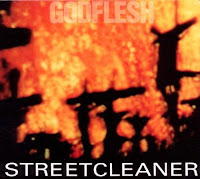>
Category Archives: philosophy
>You breed… Like rats!
>
The Greatest Shortcoming of the Human Race
Roadburn – the best festival I’ve ever been to – just announced that Godflesh are set to perform the legendary Streetcleaner album in its entirety! That sure deserves a whole bunch of exclamation marks!
This is one of the heaviest, dirtiest albums ever to grace this wicked Earth, and to be able to witness this at Roadburn is nothing but amazing. Streetcleaner was released in 1989, but still crushes most of what you’d call heavy these days. In a way, these recordings preceded the whole drone/sludge genre, and did so 22 years ago. Exclamation mark!
If you find it strange having a band playing the record just as it is when you might as well sit at home listening, you probably won’t ever understand the magick that occurs during a mighty fine concert – and Roadburn always delivers amazing gigs.
Compare listening to Through Silver In Blood at home with the onslaught that follows below:
Now worship Godflesh.
Breeding – Stylized – Deformity – Don’t look back
Breeding – Fade out – Lies – Deformity
Breed – Like Rats
You were dead from the beginning
Bonus goodness:
>Turn – Tune – Drop
>
Timothy Leary
>The End of the Apocalypse
>
 What will it take for you to finally call these last days what they really are: The end of the apocalypse.
What will it take for you to finally call these last days what they really are: The end of the apocalypse.
The extermination of six hundred species per day? The starvation of one billion people?
Do you really believe our culture will undergo a voluntary transformation to a sane way of living?
The problem is that we who benefit from the industrial economy – the civilization that must be destroyed in order for things to be created – are the ones that are destroying the planet, and we won’t accept having our benefits taken away from us. Our role as participants in the industrial economy is more important to us than being human, thus having our benefits taken away is like threatening our very existence. This is the downward spiral. This is why we’re doomed.
Lewis Mumford defined civilization’s main features as such: ”the centralization of political power, the separation of classes, the lifetime division of labor, the mechanization of production, the magnification of military power, the economic exploitation of the weak, and the universal introduction of slavery and forced labor for both industrial and military purposes.”
Most dictionaries define civilization as ”a high stage of social and cultural development, an advanced state of human society”.
Obviously, these two definitions don’t synch, and the dictionary definition makes the common mistake in presupposing our present civilization is the best, and that there is only one way to live. Oswald Spengler had a few things to say about that…
Derrick Jensen puts it best in Endgame: ”Ultimately, then, the story of this civilization is the story of the reduction of the world’s tapestry of stories to only one story, the best story, the real story, the most advanced story, the most developed story, the story of the power and the glory that is Western Civilization.”
On another note: ”The civilized notion of ownership is in truth based on force: the aquisition and maintenance of the property of the rich is the central motivating factor impelling nearly all state violence.”
Because when speaking of ownership in a ”civilized” society we mean we have the right to do whatever we want with what we own. We have the right to destroy it, if we please. However, as Spengler also put it, with ownership comes responsibility. If the farmer owns and nurtures his land it becomes his blood and flesh, and he is responsible for the continuation of that land and its health. And he will take that responsibility. We’ve forgotten all about that in this civilized capitalist part of the world, where industrial economy and technology rule.
In Man and Technics (1931), Spengler predicted that coloured people of the Earth will use the very technology of the West to destroy the West. We’ll see how that goes…
>The meaning of the curse
>
A flame traverses the blood.
To go over to the other side, circumventing death…
Let us imitate Him, on this point at least.
It is important to know this, for once assimilated, such dizzying evidence renders all formulas for wisdom superfluous.
we cannot correct them without deforming that nature, without perverting it still more.
we should see an entirely new version, either of paradise or of hell.
I was made to exist before my birth and after my death, not during my very existence.
I anticipated witnessing in my lifetime the disappearance of our species.
But the gods have been against me.
>The Falsification of Man – To What End?
>
John Zerzan
Until then, what’s important is to rise above, ride the tiger and claim the individual will to power. Black Flag, Julius Evola and Friedrich Nietzsche all rolled into one. And no, the will to power is not the will to dominate. People who preach these misinterpretations are most often people who say Nietzsche was a Nazi, even though they haven’t read one single text by the man. Ignore the ignorants.
We should acknowledge the laws of society and act as loyal citizens, to a certain extent, but since the real revolution starts within (Refused told me that sixteen years ago) we shall strike from the inside, like a samurai having taken advantage of the power of his enemy for so long, patiently awaiting the final blow to be executed with perfection and precision against the modern dying world. We shall rise from the abyss, out of the dark into the black light by means of occult warfare. Legions arise! To the death!
Well, maybe not that romantic and heroic, but one must be able to dream. Because, seriously, what kind of world awaits our children? They will inherit a culture of high anxiety, fear, stress and depression that constantly borders on a state of panic disorder. This is a world that offers no future, but fails to admit this fact. And all this chaos stems from civilization itself, a civilization that passively accepts its own decline. Hence, modern civilization is worth nothing but death.
‘Progress’ is not progress, it’s everlasting destruction
Technology is backwards
Born of machine
Worship machine
Slave to machine
Become machine
Modern civilization, a contradiction in terms
In terms of survival
Are we alone?
Man is made to obey thee… Are we nothing but living…
MACHINE
A dead hand, it’s work expresses death
No spirit in it’s skeletal framework
The falsification of Man, to what end?
To what end?
Perverted ingenuity of Man
Fools, we’ve lost our earthly wisdom
Not the way of nature
In a man-made state of disarray
>Earth Hour
>
Earth Hour makes me sick. It’s straight up hypocrisy, the masses being orchestrated by the media to turn out the lights for one hour once a year. Wow. Big deal. Everybody at the same time: We did it! We love life!
Earth Hour does practically nothing but speaks to our bad conscience.
Also, Earth Hour always starts at an hour where all big businesses are shut down. Instead of the big businesses taking responsibility for the destruction of the Earth and shutting down in the middle of the day, the joke’s on us: Turn out the lights on your free time, please, and welcome back to work tomorrow. Work, eat, consume, sleep.
Usually, I’m all for small actions leading to big change, but this, as well as the International Women’s Day and such manifestations, is like spitting in the face of real change. One hour, or one day, and then it’s all back to normal, i.e. the mindless egotistic destruction we always occupy our time with.
Mankind will never learn.
Friedrich Nietzsche, On the Genealogy of Morals
But then how did that other “gloomy business,” the consciousness of guilt, the whole “bad conscience” come into the world?—And with this we turn back to our genealogists of morality. I’ll say it once more—or have I not said anything about it yet?—they are useless. With their own merely “modern” experience extending through only a brief period [fünf Spannen lange], with no knowledge of and no desire to know the past, even less a historical instinct, a “second sight”— something necessary at this very point—they nonetheless pursue the history of morality. That must justifiably produce results which have a less than tenuous relationship to the truth. Have these genealogists of morality up to now allowed themselves to dream, even remotely, that, for instance, that major moral principle “guilt” [Schuld] derived its origin from the very materialistic idea “debt” [Schulden]? Or that punishment developed as a repayment, completely without reference to any assumption about freedom or lack of freedom of the will?—and did so, by contrast, to the point where it always first required a high degree of human development so that the animal “man” began to make those much more primitive distinctions between “intentional,” “negligent,” “accidental,” “responsible,” and their opposites and bring them to bear when meting out punishment? That idea, nowadays so trite, apparently so natural, so unavoidable, which has even had to serve as the explanation how the feeling of justice in general came into existence on earth, “The criminal deserves punishment because he could have acted otherwise,” this idea is, in fact, an extremely late achievement, indeed, a sophisticated form of human judgment and decision making. Anyone who moves this idea back to the beginnings is sticking his coarse fingers inappropriately into the psychology of older humanity. For the most extensive period of human history, punishment was certainly not meted out because people held the instigator of evil responsible for his actions, and thus it was not assumed that only the guilty party should be punished:—it was much more as it still is now when parents punish their children out of anger over some harm they have suffered, anger vented on the perpetrator—but anger restrained and modified through the idea that every injury has some equivalent and that compensation for it could, in fact, be paid out, even if that is through the pain of the perpetrator. Where did this primitive, deeply rooted, and perhaps by now ineradicable idea derive its power, the idea of an equivalence between punishment and pain? I have already given away the answer: in the contractual relationship between creditor and debtor, which is, in general, as ancient as the idea of “legal subject” and which, for its part, refers back to the basic forms of buying, selling, bartering, trading, and exchanging goods.







